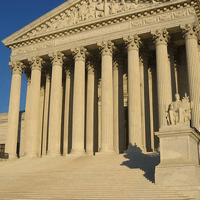The Supreme Court's recent ruling on Holder v. Humanitarian Law Project tightens the straightjacket that our current terrorist list system has placed on American diplomats and social scientists. In a 6-3 decision, the court ruled that the First Amendment does not protect groups or individuals who provide "expert advice or assistance" or "training" for pacific means to proscribed terrorist groups. For non-governmental peacebuilding groups that conduct workshops and promote dialogue as critical elements of their work, this decision is catastrophic. Now, even individuals who, through direct communication, urge proscribed terrorist groups to disarm and participate in negotiations are vulnerable to prosecution in a U.S. court.
Chief Justice John Roberts argued that the 2001 Patriot Act's broad definition of material support to terrorism was necessary to block "aid that makes the attacks more likely to occur." However, this betrays a misunderstanding of what practitioners of peacebuilding actually do. Unlike humanitarian support, which could potentially free up resources for military spending by providing free food and social services, the services provided by peacebuilding groups cannot be diverted.
Part of the problem is the lists themselves. Beginning with the U.S. Anti-Terrorism and Effective Death Penalty Act of 1996, the U.S. created a series of overlapping terrorist lists managed by different government agencies, including the Foreign Terrorist Organization (FTO) list, the Specially Designated Nationals and Blocked Persons (.pdf) (SDN) list and the Terrorist Exclusion List (TEL). Such lists are an important element of U.S. counterterrorism policy. But they are a blunt instrument -- too calcified, too bureaucratic, and too resistant to modification when political realities shift. All of the groups on the terrorist lists are dangerous and violent, but some less so than others. The lists force the U.S. to adopt a uniform policy that disregards the variety among terrorist entities in size, location, ideology and capabilities -- and the differences in how they might respond to incentives and disincentives.

